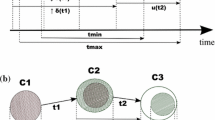Abstract
Time Petri nets are a powerful formal model for the specification and verification of real-time systems. End-to-end delays in task execution are a key requirement to real-time systems. In this paper, we propose a state class method based on time Petri nets for the computation of end-to-end delays. By introducing time constraints of fired transitions into firing domains of state classes, the computation of end-to-end delays can be performed synchronously with the evolution of state classes in the same firing rules. Therefore, the proposed method avoids the maintain of all visited state classes along an execution trace in the global set method, and is suitable for the on-the-fly verification of time properties based on time Petri nets.
Access this chapter
Tax calculation will be finalised at checkout
Purchases are for personal use only
Similar content being viewed by others
References
Murata T (1989) Petri nets: properties, analysis and applications. Proc IEEE 77(4):541–580
Ramchandani C (1974) Analysis of asynchronous concurrent systems by timed Petri nets. Project MAC, technical report 120, Massachusetts Institute of Technology
Merlin P, Farber DJ (1976) Recoverability of communication protocols: implication of a theoretical study. IEEE Trans Commun 24(9):1036–1043
Berthomieu B, Diaz M (1991) Modeling and verification of time dependent systems using time Petri nets. IEEE Trans Softw Eng 17(3):259–273
Wang J, Xu G, Deng Y (2000) Reachability analysis of real-time systems using time Petri nets. IEEE Trans Syst, Man, Cybernetics, 30(5):725–736
Xu D, He X, Deng Y (2002) Compositional schedulability analysis of real-time systems using time Petri nets. IEEE Trans Softw Eng 28(10):984–996
Vicario E (2001) Static analysis and dynamic steering of time dependent systems using time Petri nets. IEEE Trans Softw Eng 27(8):728–748
Wu N, Zhou MC (2010) A closed-form solution for schedulability and optimal scheduling of dual-arm cluster tools with wafer residency time constraint based on steady schedule analysis. IEEE Trans Autom Sci Eng 7(2):303–315
Acknowledgments
This work was supported by Hunan Provincial Natural Science Foundation of China (11JJ4058) and Scientific Research Fund of Hunan Provincial Education Department (11A041).
Author information
Authors and Affiliations
Corresponding author
Editor information
Editors and Affiliations
Rights and permissions
Copyright information
© 2013 Springer-Verlag Berlin Heidelberg
About this paper
Cite this paper
Pan, L. (2013). End-to-End Delay Computation for Time Petri Nets. In: Lu, W., Cai, G., Liu, W., Xing, W. (eds) Proceedings of the 2012 International Conference on Information Technology and Software Engineering. Lecture Notes in Electrical Engineering, vol 210. Springer, Berlin, Heidelberg. https://doi.org/10.1007/978-3-642-34528-9_76
Download citation
DOI: https://doi.org/10.1007/978-3-642-34528-9_76
Published:
Publisher Name: Springer, Berlin, Heidelberg
Print ISBN: 978-3-642-34527-2
Online ISBN: 978-3-642-34528-9
eBook Packages: EngineeringEngineering (R0)




